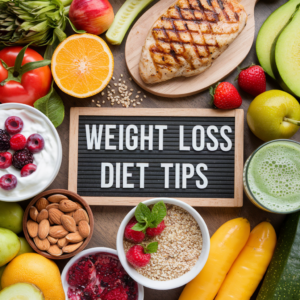Do’s and Don’ts of the Low-Fat Diet: How to Promote Weight Loss and Heart Health
Introduction
The Low-Fat Diet is designed to help you lose weight and improve your heart health by reducing unhealthy fats and focusing on nutrient-dense, low-fat foods. However, to achieve the best results, it’s important to follow the right guidelines and avoid common mistakes. This list of essential do’s and don’ts  will help you stay on track, choose the right foods, and promote effective weight loss while supporting heart health.
will help you stay on track, choose the right foods, and promote effective weight loss while supporting heart health.
Do’s of the Low-Fat Diet
1. Do Focus on Lean Protein Sources
Lean proteins like chicken, turkey, fish, beans, and legumes are low in fat but high in nutrients. Make sure to include a source of lean protein in every meal to support muscle maintenance and fat loss while keeping your fat intake low.
2. Do Eat Plenty of Fruits and Vegetables
Fruits and vegetables are naturally low in fat and high in fiber, vitamins, and minerals. Fill your plate with a variety of colorful fruits and vegetables to provide essential nutrients and promote fullness without adding extra fat.
3. Do Choose Whole Grains Over Refined Carbs
Whole grains like brown rice, quinoa, and oats provide complex carbohydrates that offer sustained energy without added fats. Avoid refined carbs like white bread and sugary snacks, which can spike blood sugar and hinder weight loss.
4. Do Read Labels Carefully
Many packaged foods labeled as “low-fat” or “fat-free” are high in added sugars and refined carbohydrates. Always check labels for hidden ingredients that may hinder your weight loss progress and choose whole, unprocessed foods instead.
5. Do Include Healthy Fats in Moderation
While the Low-Fat Diet emphasizes reducing unhealthy fats, it’s important to include small amounts of healthy fats in your meals. Sources like avocado, olive oil, and nuts provide essential fatty acids that support brain function, hormone production, and heart health.
Don’ts of the Low-Fat Diet
1. Don’t Rely on Processed “Low-Fat” Foods
Many processed “low-fat” or “fat-free” foods contain added sugars and artificial ingredients to make up for the lack of fat. These foods can actually hinder your weight loss efforts. Focus on whole, natural foods instead of processed, low-fat options.
2. Don’t Skip Healthy Fats Entirely
Fats are essential for brain function, hormone production, and overall health. While the Low-Fat Diet focuses on reducing fat intake, it’s important not to eliminate healthy fats entirely. Include moderate amounts of healthy fats from sources like avocados, nuts, seeds, and olive oil.
3. Don’t Overeat Refined Carbohydrates
Some people compensate for reducing fat by overeating refined carbohydrates, such as white bread, sugary cereals, and processed snacks. This can lead to blood sugar spikes and increased cravings. Instead, choose complex carbohydrates like quinoa, brown rice, and whole grains.
4. Don’t Neglect Portion  Control
Control
Even though the Low-Fat Diet focuses on reducing fats, it’s still important to practice portion control. Overeating any type of food, even low-fat foods, can lead to excess calorie consumption and slow down your weight loss progress.
5. Don’t Avoid Protein
Protein is essential for muscle maintenance and fat loss. Make sure to include a source of lean protein in every meal, such as chicken, fish, eggs, or beans, to support your weight loss efforts and keep you full and satisfied.
Conclusion
The Low-Fat Diet is an effective way to lose weight and improve your heart health by focusing on nutrient-dense, low-fat foods and reducing unhealthy fats. By following these essential do’s and don’ts, you can promote sustainable fat loss, make healthier food choices, and support long-term cardiovascular health. Focus on whole, natural foods, avoid processed low-fat products, and include moderate amounts of healthy fats to ensure your success on the Low-Fat Diet.